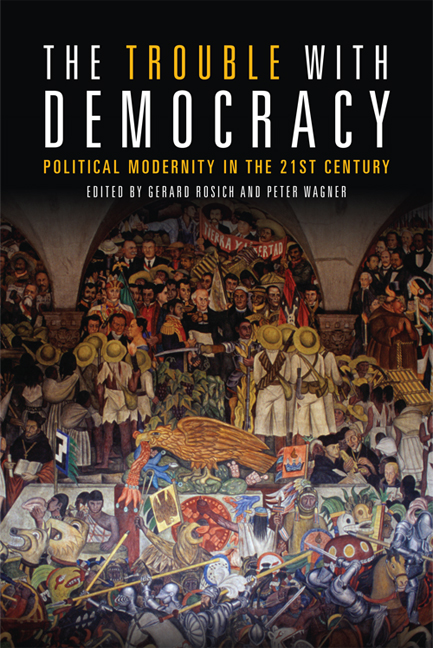Book contents
- Frontmatter
- Contents
- Acknowledgements
- List of Contributors
- 1 Introduction: Re-Interpreting Democracy for Our Time
- 2 Autonomy in and between Polities: Democracy and the Need for Collective Political Selves
- 3 Rethinking ‘Modern’ Democracy: Political Modernity and Constituent Power
- 4 Democratic Surplus and Democracy-in-Failing: On Ancient and Modern Self-Cancellation of Democracy
- 5 Setbacks of Women's Emancipation (Condition, Consequence, Measure and Ruse)
- 6 Political Modernity, Democracy and State–Society Relations in Latin America: A New Socio-Historical Problématique?
- 7 Communitarian Cosmopolitanism: Argentina's Recuperated Factories, Neoliberal Globalisation and Democratic Citizenship. An Arendtian Perspective
- 8 Middle-Classing in Roodepoort: Unexpected Sites of Post-Apartheid ‘Community’
- 9 Democracy and Capitalism in Europe, Brazil and South Africa
- 10 From Realism to Activism: A Critique of Resignation in Political Theory
- 11 The World as We Find It: A Suggestion for a Democratic Theory for Our Times
- 12 Epilogue: Democracy as Capacity for Self-Transformation
- Index
2 - Autonomy in and between Polities: Democracy and the Need for Collective Political Selves
Published online by Cambridge University Press: 05 September 2016
- Frontmatter
- Contents
- Acknowledgements
- List of Contributors
- 1 Introduction: Re-Interpreting Democracy for Our Time
- 2 Autonomy in and between Polities: Democracy and the Need for Collective Political Selves
- 3 Rethinking ‘Modern’ Democracy: Political Modernity and Constituent Power
- 4 Democratic Surplus and Democracy-in-Failing: On Ancient and Modern Self-Cancellation of Democracy
- 5 Setbacks of Women's Emancipation (Condition, Consequence, Measure and Ruse)
- 6 Political Modernity, Democracy and State–Society Relations in Latin America: A New Socio-Historical Problématique?
- 7 Communitarian Cosmopolitanism: Argentina's Recuperated Factories, Neoliberal Globalisation and Democratic Citizenship. An Arendtian Perspective
- 8 Middle-Classing in Roodepoort: Unexpected Sites of Post-Apartheid ‘Community’
- 9 Democracy and Capitalism in Europe, Brazil and South Africa
- 10 From Realism to Activism: A Critique of Resignation in Political Theory
- 11 The World as We Find It: A Suggestion for a Democratic Theory for Our Times
- 12 Epilogue: Democracy as Capacity for Self-Transformation
- Index
Summary
In the field of political theory, one finds several paradoxes which signal that now, at the beginning of the twenty-first century, we are living in times of change. Beyond the historical periodisation that one might wish to choose in order to identify on the timeline an event that could shed light on this moment of transformation, there is an absence of clear ideas as to the subterranean currents hidden beneath these events. The widespread use of the term ‘globalisation’ and its political twin brother, cosmopolitanism, is explained in part by the suggestion that it would seem to offer some kind of response to these ‘processes’. Nonetheless, one senses that the term is only useful if it refers to a new reality, namely global connectedness in the broadest sense of the expression. What is paradigmatic about this fact, in relation with the past, would be that globalisation now de facto affects the entire surface of the planet and it would not simply represent an ideal. The problem with a simple confirmation of global connectedness is that it does not contemplate either what the nexus might consist of, or what form the co- takes, or whether global refers to the physical globe of the world or to the human world. One current trend in world history attempts to elucidate how we have come to this new reality, and many people seem to agree that ‘globalisation’ has its beginnings, grosso modo, with modern times. The advantage of this approximation is that it is generally useful when it comes to explaining why the West achieved global dominance after the end of the nineteenth century, but it does not help much at the point where what is to be explained in the study, namely the global economic and political supremacy of the West, is no longer a reality as such: the world is not, if it ever was, only Western.
The aim of this chapter is to assess the prospects for democracy, here understood as the commitment to autonomy as self-determination, against this background. It is suggested that democracy is in fundamental conflict with the contemporary individualist understanding of the polity and with theories that link its endurance under globalisation to cosmopolitanism.
- Type
- Chapter
- Information
- The Trouble with DemocracyPolitical Modernity in the 21st Century, pp. 19 - 49Publisher: Edinburgh University PressPrint publication year: 2016

